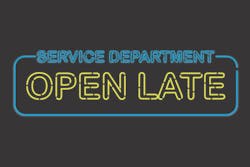The work rarely stops rolling in at Fred Anderson Toyota, in Raleigh, N.C. The dealership’s service department consistently cranks out nearly 6,000 customer-pay ROs per month, making it one of the more productive facilities in the southeast.
That’s why general manager Andy Little has had no qualms in recent years about extending service department hours, even until 11 p.m. for a recent trial period.
“Customers seem to love the new hours, and the convenience,” Little says. “I think most of them are shocked.”
Anderson Toyota expanded its service hours in 2015. But that wasn’t always a smooth process, due to multiple factors, not the least of which was getting its express lane to operate without any hitches.
Scheduling Concerns
The leadership team at Anderson Toyota originally decided to expand service hours largely because the facility’s express lane was inundated with a steady stream of customer vehicles, Little says. The service department simply couldn’t keep pace with its ceaseless workload.
And, that’s an especially big issue when 70 percent of your department’s business consists of oil changes, tire rotations, and the like.
“It was taking too many days to book an express appointment—2–3 days,” explains Little, who has worked at the Raleigh dealership for nearly two decades.
Closing the service department at 6 p.m. on weekdays simply wasn’t working. Anderson Toyota’s CSI served as evidence of that, as it sunk to a number Little deemed unacceptably low: 88.5.
“I think dealers should look at extended hours if they have capacity issues,” Little says. “Because you’re going to lose those customers if it takes 'em four days to make an oil change appointment; they’re just going to go somewhere else.”
Of course, there are two main reasons most service departments in America aren’t open late at night: First, managers need to get employees on board with working atypical hours; additionally, the expanded schedule needs to be marketed, so customers can get used to the notion of late-night maintenance hours.
At Your Service
In early 2015, Anderson Toyota pushed its closing time from 6 p.m. all the way back to 11 p.m., Monday–Thursday. The facility expanded its schedule by two additional hours on Saturdays, staying open from 6 a.m.–5 p.m. And, the executive team even decided to add a Sunday shift, from 9 a.m.–5 p.m.
Somewhat surprisingly, Little got many employees to embrace the extended shifts. The dealership’s leaders increased employees’ pay in the wake of the scheduling change (one perk: many employees then got Fridays and Saturdays off). And, the dealer turned to hiring websites like Indeed to add nearly 50 new staffers by seeking job prospects who needed to have day-time hours off.
“We did that to add to capacity,” Little says of the change in the service department schedule. “One of the things that’s important to me is to be open late enough for people to come here after work, and not have to service their vehicles during work hours, or on the weekends.
“If it’s during the week, it’s very difficult for somebody to leave work and be here by 5 o’clock. Now, customers can be here by 6:30 and have an appointment. And that will also allow us to fill our shop up every day.”
Customers promptly gave positive feedback once Anderson Toyota expanded its service schedule. And, the dealership spread the word of the scheduling change via a marketing campaign that mainly consisted of TV ads, along with mentions in the dealer’s monthly newsletter. What’s more, the facility started a “Family Service Program,” in which vehicles that simply required light maintenance could be dropped off at night and picked up the next morning.
(Extended) Time is Money
In late 2017, Anderson Toyota made one more scheduling tweak, shifting its service department hours slightly. After closely studying the facility’s usual workload, the dealer’s leaders decided to keep the department open from 7 a.m.–8 p.m. Monday–Friday, and 7 a.m.–7 p.m. on Saturday. The North Carolina facility has done away with its Sunday shift, deeming it no longer necessary.
The dealership’s service department staffers now work four 13-hour shifts each week—which helps employees typically work with the same clients throughout an entire day, rather than having to pass work on to coworkers during shift changeovers.
“We’re shortening our hours, but increasing the capacity by 15–20 percent,” Little explains.
He continues to hear positive feedback from customers, which has left him convinced that expanding his service department hours was the right move.
“The ability for people to service vehicles during the week, outside of normal hours, was the biggest thing that we got feedback from customers about,” Little notes.
Anderson Toyota’s CSI score recently reached 94.0, and customer retention has become the envy of the region, at 67 percent.
Little says deft, well thought-out hiring is pivotal when attempting to implement an expanded service department schedule.
“The biggest key to making it work is to be able to recruit new talent,” he says. “We sell our vision of, ‘We’ll take you from lube tech to master tech, and provide you the time and training to do that, and pay for the classes'.”
As a result, Little adds, he now has a valuable technician in every bay, throughout each workday.
No Day of Rest: How to Implement Sunday Shifts
A few years back, in an effort to appease customers in the competitive market around Atlanta, Rick Hendrick Toyota Sandy Springs started a Sunday service department shift. Service director Michael Rodriguez explains how the Sunday shift has worked at a facility with a 93.9 CSI score and annual sales in service of approximately $6 million.
Why have Sunday shifts? Our business is about customer retention, so we want to make it as convenient as possible, so we can earn their business for the long term.
On Sundays we work on brakes, alignment or tires. Nothing too in depth; I'm staffing up now to be able to do the recalls on Sundays. We're up to working on 90-100 cars on Sunday, on the average.
Getting the staff to buy in is a challenge; incentivizing has helped. I offered bonuses for working on Sunday at the beginning. I even offered time-and-a-half to my porters. Because, if you just force somebody to do something, you're going to get a lot of pushback.
To make a Sunday shift work, you need 100 percent commitment. If the commitment isn't there, from the top down at a dealership, it's not going to work. Staff up and commit to it. If you do that, you'll see results.

